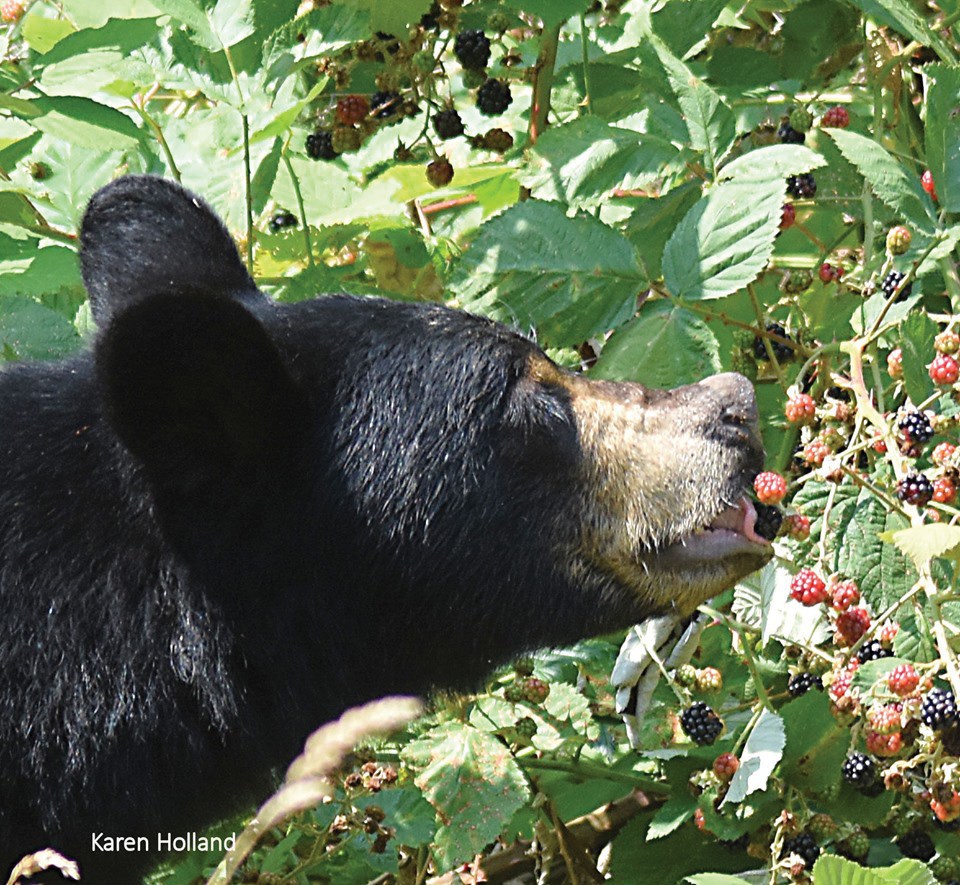Rain and the fruit it yields has led to a drop in wildlife encounters on the Sunshine Coast, following a dry and sparse springtime with an above-average conflict count.
“We had a very busy May and June and then July hits and it was almost as if somebody turned a switch off and we’ve had fairly low number of bear calls for July and August,” said Sgt. Dean Miller, conservation officer for the Lower Sunshine Coast.
Calls to the Conservation Officer Service (COS) rose to 90 in May from 41 in April and then increased to 167 in June. Calls then dropped back down to 89 in July and were at 16 in August, as of Monday.
The change in weather and availability of wild food sources have led to the decrease, Miller said. “We were getting hot temperatures and extended periods without rain and then late June and July hit and we had more typical rainfall for the summer and you can see the production of blackberries in the community – they are very high. That’s going to keep the bears fed.”
A drop in cougar-related calls has also been observed. In early June the COS set a live trap to catch a cougar at Irvines Landing in Pender Harbour that was reportedly stalking pedestrians, and which snatched a dog into its mouth after the dog had attempted to pursue it. The cougar was never caught but calls diminished.
“Even with that incident, I’m sure that cougar was focused on the deer and nothing else,” Miller said.
While no bear break-ins have occurred for “a few months,” according to Miller, food-conditioned bears have been identified in Gibsons, West Sechelt and Halfmoon Bay.
Conservation officers are also monitoring a black bear sow and two cubs that have been repeatedly observed in West Sechelt since the second week of July. The sow appears to have suffered a severe injury that has resulted in limited mobility. “It’s almost as if she has a spinal injury, so she drags her back end around and of course a bear that’s injured and has limited mobility will seek easier food sources,” he said.
Miller is asking that people in the area pick the fruit in their backyard and keep bear attractants such as birdfeeders and compost from their properties, as they have been forced to chase the bear from people’s backyards.
Officers are observing the sow and are hoping she and her two healthy cubs will be able to den over the winter, which would prevent the need for intervention. Otherwise, the bear cubs would have to be transported to a wildlife rehabilitation centre in Langley for the next 10 months, until they can be released back into the wild at the right age. “We’re hopeful that they can make it to den but we have to manage her ability to defend her cubs,” said Miller, who added the sow appears to have lost weight since they began monitoring the situation.
While calls have diminished over the past two months, Miller said he expects conflicts to ramp up again heading into the fall as berries become scarce. “Once the blackberries and blueberries and huckleberries are all done, that’s typically the time that we see an influx of conflict-related calls,” he said.
Calls related to black bears were up across the province in May and June compared to other years, but the number of calls dropped off in July.



